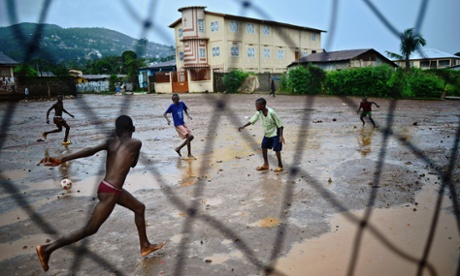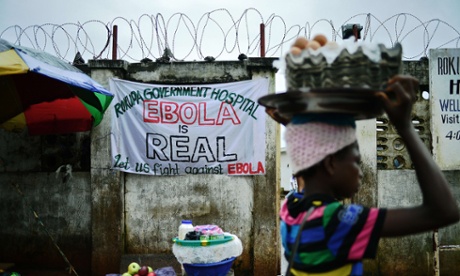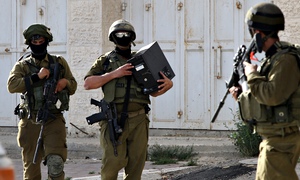
It’s midnight and I am driving around the East End of Freetown, Sierra Leone’s capital, with a young taxi driver known as Human Right. For the past year I have regularly accompanied Human Right while he works as part of my doctoral research in anthropology. The East End is usually buzzing at night; every junction packed with people drinking, eating street food, and hanging out. But tonight there are only a handful of passengers. “The streets are dry,” Human Right says.
The rainy season is slowing down now, which normally means more people on the streets and more business for many, including taxi drivers. But in the past month Sierra Leone’s government has issued numerous restrictions to try to tackle the country’s Ebola outbreak. Motorbike taxis are running on a limited basis during daylight hours. Places of assembly, such as bars, cinemas and schools, are closed around the country. Travel in and out of the outbreak epicentres in the east is severely restricted. Many people do not have places to go, or money to spend.
Human Right says out that Sierra Leone’s elite are not suffering from the Ebola epidemic as much as ordinary people. He’s not the only one who believes that some even stand to benefit from donations from the international community and local big businesses. Wealthy people also have a lower risk of infection than those who work on the streets.
We approach a police checkpoint as we head downtown. They pull us over and point out various problems with the car, threatening to take us to the police station. As expected, Human Right gives them a portion of his earnings and we continue.
With fewer drivers on the streets the traffic police, who gain rely on income from bribes and fines, are resorting to harsher penalties. Human Right is confident that the crisis will end soon; the dry weather will kill the virus, which thrives, he believes, in wet.
But some are less sure. Abdul Johnson is a police officer, a neighbour and a drinking buddy. A few months ago, when it wasn’t clear to anyone whether all the talk about Ebola was rumour, conspiracy or reality, Johnson was sceptical.
He suggested that Ebola had been fabricated by the government to siphon international aid money; or that it was part of a terrorist plot to drain the country’s resources. Now, like many others, he is critical of the government for not acting more quickly when the outbreak began in neighbouring Guinea, allowing the virus to fester and spread.
These suspicions of the government are not uncommon or, in other cases, unfounded. They reflect genuine experiences of corruption and inequality.
Most people here feel a sense of disconnect between their own experiences and the international media reports that place them in the heart of a global crisis. Everyone I speak to insists they do not know anyone who has Ebola; the epicentres of the disease are in the east, several hours drive from Freetown. They point out that Sierra Leoneans suffer all the time in multiple ways, but rarely get the international attention and relief that is being directed at Ebola.

Johnson compares this to the way residents of Freetown experienced the country’s civil war, which took place between 1991 and 2002. For many of those years the war did not seem to have reached Freetown. Most of the fighting was taking place in the provinces – the same regions that are most affected by Ebola.
Thousands fled to the capital but for long periods it was hard to travel because then, like now, roads were often heavily policed or blocked. But life continued in Freetown, albeit with an even greater sense of uncertainty, until the city was invaded in January 1999 with disastrous consequences.
Similar insecurities are being felt in Freetown now. It is not just school and work that have been affected. Johnson is waiting until the restrictions on gatherings are lifted – and also until more money becomes available – to perform the naming ceremony for his new-born son. Most people I know are waiting for normality and greater clarity, rather than disaster.
One such person is Hawa Bangura, who runs a small grocery shop outside her mother’s house in Congo Town. She set up the shop in partnership with her boyfriend, who works as a receptionist at a guesthouse and restaurant frequented by expats. Bangura is half-way through a four year university course in financial services but does not know whether classes will start as usual next month. Her boyfriend has been laid off until further notice; most potential customers have left the country and most airlines have stopped flying to Sierra Leone.
This puts more pressure on Bangura, as there are more people relying solely on the shop. At the same time stock prices have risen. Many items are imported through Guinea but with the border currently closed they are either smuggled at great cost or sourced elsewhere. Goods from Sierra Leone, such as coal and palm oil, are also harder to obtain now that the luma, the weekly produce markets, have been banned.
The vast majority of Freetown residents have yet to witness a single case of Ebola firsthand, yet it remains the dominant topic of conversation. There’s a joke doing the rounds that involves friends starting to shake hands but then comically turning away, as if to avoid any human contact that could cause infection. Knowing what to believe and who trust is not easy, and it’s surprising how most people do not consider themselves to be at risk of catching the virus itself. But the economic and social fallout from the crisis are inescapable.
This article first appeared on Think Africa Press
















